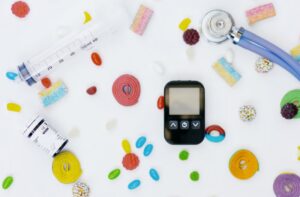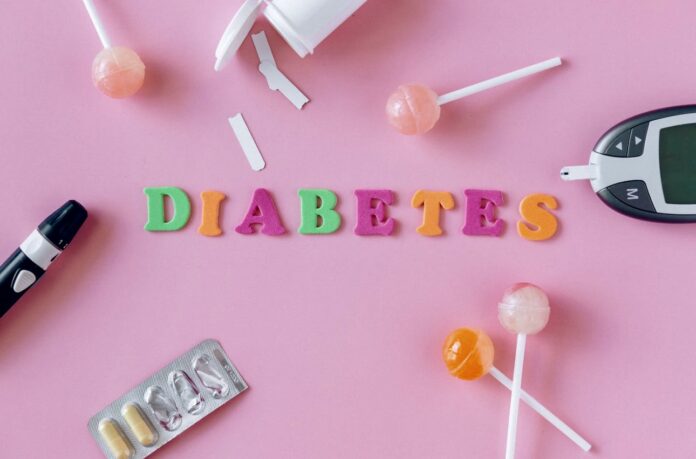Glicemia, o livello di zucchero nel sangue, è un parametro cruciale per la salute generale. Mantenere la glicemia sotto controllo è essenziale per prevenire una serie di complicazioni alla salute. Ma quali sono le conseguenze di livelli troppo alti o troppo bassi? E quali trattamenti e modifiche dello stile di vita possono aiutare a mantenere la glicemia sotto controllo?
La glicemia è il livello di zucchero (glucosio) nel sangue ed è essenziale per il corretto funzionamento del corpo. Il glucosio fornisce energia alle cellule del corpo e regola molti processi vitali; tuttavia, livelli di glicemia eccessivamente alti o bassi possono avere conseguenze negative sulla salute.

Glicemia bassa: La glicemia bassa, anche nota come ipoglicemia, può causare una serie di sintomi sgradevoli e, nei casi gravi, può essere potenzialmente letale. I sintomi includono vertigini, confusione, sudorazione eccessiva, debolezza e talvolta perdita di conoscenza. Nei casi estremi, l’ipoglicemia può portare a convulsioni e coma.
La glicemia bassa, o ipoglicemia, può causare una serie di complicazioni mediche se non trattata prontamente, tra cui:
- Confusione e difficoltà cognitive: i bassi livelli di glucosio nel sangue possono influenzare le funzioni cognitive, causando confusione, difficoltà di concentrazione e problemi di memoria.
- Debolezza e stanchezza: la mancanza di energia fornita dai bassi livelli di glucosio può causare sensazioni di debolezza e stanchezza, compromettendo la capacità di svolgere le attività quotidiane.
- Irritabilità e cambiamenti d’umore: l’ipoglicemia può influenzare l’equilibrio degli ormoni nel corpo, causando irritabilità, ansia, nervosismo e sbalzi d’umore.
- Palpitazioni e sudorazione eccessiva: i bassi livelli di glucosio possono stimolare il sistema nervoso simpatico, causando palpitazioni cardiache e sudorazione eccessiva.
- Tremori e sensazione di fame: l’ipoglicemia può causare tremori, sudorazione fredda, intensa fame e vertigini.
- Perdita di conoscenza: nei casi gravi e non trattati, l’ipoglicemia può portare alla perdita di conoscenza, convulsioni e coma, mettendo a rischio la vita del paziente.
Ma cosa si può fare per riportare i livelli di zucchero nel sangue alla normalità?
Quando si manifestano sintomi di ipoglicemia, è essenziale agire prontamente per riportare la glicemia ai valori normali.
- Consumare carboidrati veloci: consumare una fonte di carboidrati veloci, come succhi di frutta, bevande sportive o caramelle alla frutta, può aiutare ad aumentare rapidamente i livelli di glucosio nel sangue.
- Mangiare pasti regolari: dividere l’assunzione alimentare in pasti regolari e spuntini può aiutare a mantenere stabili i livelli di glucosio nel sangue durante il giorno.
- Monitorare attentamente i livelli di glucosio: per le persone con diabete o altre condizioni che aumentano il rischio di ipoglicemia, è importante monitorare regolarmente i livelli di glucosio nel sangue e adottare misure preventive.
- Evitare eccesso di insulina o farmaci ipoglicemizzanti: se si utilizzano farmaci che possono abbassare il glucosio nel sangue, è essenziale seguire attentamente le istruzioni del medico e regolare le dosi in base alle esigenze individuali.
- Ridurre l’attività fisica intensa: l’attività fisica intensa può aumentare il rischio di ipoglicemia, specialmente se non è adeguatamente compensata dall’assunzione di carboidrati. Ridurre l’intensità dell’esercizio fisico o aumentare l’assunzione di carboidrati prima dell’attività fisica può aiutare a prevenire l’ipoglicemia.
- Consultare un medico: in caso di ipoglicemia grave o ricorrente, è importante consultare un medico per valutare la causa sottostante e sviluppare un piano di gestione personalizzato.
Gestire la glicemia bassa richiede una risposta pronta e mirata per prevenire gravi complicazioni. Seguire le istruzioni del proprio medico, adottare uno stile di vita sano e monitorare attentamente i livelli di glucosio nel sangue sono passaggi cruciali per mantenere la salute e il benessere generale.
Glicemia alta: La glicemia alta, o iperglicemia, è un segno di problemi con la regolazione del glucosio nel sangue ed è associata a condizioni come il diabete. La glicemia alta può causare sintomi come sete eccessiva, minzione frequente, affaticamento, visione offuscata e improvvisa perdita di peso. Nel lungo termine, l’iperglicemia può portare a gravi complicazioni come danni ai vasi sanguigni, malattie cardiache, danni ai nervi e problemi renali.
- Danni ai vasi sanguigni: livelli elevati di zucchero nel sangue possono danneggiare i vasi sanguigni nel tempo, aumentando il rischio di malattie cardiovascolari come l’aterosclerosi, l’ipertensione e le malattie cardiache.
- Danni ai nervi: l’iperglicemia può danneggiare i nervi nel corpo, causando neuropatia diabetica. Questa condizione può portare a dolore, intorpidimento, debolezza e altri problemi di sensibilità nelle mani, nei piedi e in altre parti del corpo.
- Danni agli occhi: l’elevato livello di zucchero nel sangue può danneggiare i vasi sanguigni nella retina, portando a problemi di vista come retinopatia diabetica, glaucoma e cataratta.
- Danni ai reni: l’iperglicemia può danneggiare i reni nel tempo, causando nefropatia diabetica. Questa condizione può portare a insufficienza renale e alla necessità di dialisi o trapianto di reni.
- Complicazioni cardiovascolari: l’iperglicemia è un fattore di rischio significativo per lo sviluppo di malattie cardiovascolari, tra cui ictus, infarti cardiaci e malattie delle arterie coronarie.
- Complicazioni neurologiche: l’iperglicemia può influenzare il funzionamento del sistema nervoso centrale, causando problemi di memoria, problemi di concentrazione, problemi di coordinamento e disfunzione cognitiva.

Ma cosa si può fare per riportare i livelli elevati di zucchero nel sangue alla normalità?
Quando si manifestano sintomi di iperglicemia o vengono rilevati livelli elevati di zucchero nel sangue, è importante agire prontamente per ridurre il glucosio nel sangue ai livelli normali. Ecco alcuni passaggi importanti da seguire.
- Aumentare l’attività fisica: l’esercizio fisico regolare può aiutare a ridurre i livelli di zucchero nel sangue aumentando l’assorbimento del glucosio nelle cellule muscolari. Attività come camminare, correre, nuotare o praticare yoga possono essere utili.
- Monitorare la propria dieta: limitare l’assunzione di cibi ad alto contenuto di zucchero e carboidrati raffinati può aiutare a mantenere stabili i livelli di zucchero nel sangue. Optare per cibi ricchi di fibre, proteine magre e grassi sani può aiutare a controllare l’assorbimento dello zucchero nel sangue.
- Monitorare i livelli di zucchero nel sangue: per le persone con diabete o altre condizioni che aumentano il rischio di iperglicemia, è importante monitorare regolarmente i livelli di glucosio nel sangue e adottare misure preventive per mantenerli sotto controllo.
- Regolare i farmaci: se si assumono farmaci per controllare lo zucchero nel sangue, è importante seguire attentamente le istruzioni del medico e regolare le dosi in base alle esigenze individuali. In alcuni casi, potrebbe essere necessario modificare la terapia farmacologica o aggiungere nuovi farmaci per controllare efficacemente lo zucchero nel sangue.
- Consultare un medico: in caso di iperglicemia persistente o sintomi gravi, è importante consultare un medico per valutare la causa sottostante e sviluppare un piano di trattamento personalizzato. Il medico potrebbe raccomandare ulteriori test per valutare lo stato di salute generale e identificare eventuali complicazioni legate all’iperglicemia.
Gestire l’iperglicemia richiede una risposta pronta e mirata per prevenire gravi complicazioni. Seguire le istruzioni del proprio medico, adottare uno stile di vita sano e monitorare attentamente i livelli di glucosio nel sangue sono passaggi cruciali per mantenere la salute e il benessere generale.
Cura: Per diagnosticare la glicemia alta o bassa, è necessario sottoporsi a un esame del sangue chiamato esame della glicemia. Questo test misura il livello di glucosio nel sangue in un dato momento, ma possono essere effettuati test come l’emoglobina A1c per valutare il controllo della glicemia nel tempo.
Il trattamento della glicemia dipende naturalmente dalla causa sottostante. Per l’ipoglicemia, potrebbe essere necessario aumentare l’assunzione di carboidrati o regolare la dose di farmaci, se appropriato. Per l’iperglicemia, potrebbe essere necessario modificare la dieta, aumentare l’esercizio fisico e, in alcuni casi, assumere farmaci per controllare lo zucchero nel sangue. Nei casi più gravi, potrebbe essere necessaria l’insulina o altri farmaci.
Prevenzione: La prevenzione, in qualsiasi campo medico, è essenziale per cercare di evitare malattie, motivo per cui adottare uno stile di vita sano è così importante per mantenere sotto controllo lo zucchero nel sangue. Ciò include una dieta equilibrata ricca di frutta, verdura, cereali integrali e proteine magre, evitando cibi ricchi di zuccheri aggiunti e grassi saturi. L’esercizio fisico regolare è essenziale per migliorare la sensibilità all’insulina e aiutare a mantenere sotto controllo lo zucchero nel sangue. Infine, evitare di fumare e moderare il consumo di alcol può aiutare a ridurre il rischio di sviluppare problemi di glicemia.
Gestire la glicemia è cruciale per la salute e il benessere generale. Monitorare attentamente i livelli di glucosio nel sangue, adottare uno stile di vita sano e cercare il trattamento appropriato sono passaggi cruciali per prevenire complicazioni e mantenere il corpo in equilibrio. Se si hanno sintomi sospetti o preoccupazioni sulla glicemia, è importante consultare un medico o un endocrinologo per una valutazione approfondita e un piano di trattamento personalizzato.
*Le informazioni contenute in questo articolo non sono a scopo diagnostico e in nessun caso sostituiscono il parere medico. Vorremmo ricordare che è sempre importante consultare il proprio medico di famiglia o uno specialista in caso di sintomi e/o malattie.
Ig – @fairness_mag




